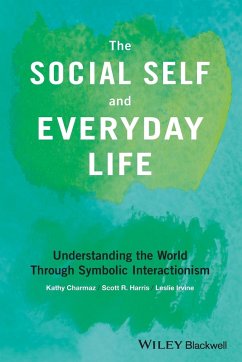An engaging text that enables readers to understand the world through symbolic interactionism
This lively and accessible book offers an introduction to sociological social psychology through the lens of symbolic interactionism. It provides students with an accessible understanding of this perspective to illuminate their worlds and deepen their knowledge of other people's lives, as well as their own. Written by noted experts in the field, the book explores the core concepts of social psychology and examines a collection of captivating empirical studies. The book also highlights everyday life--putting the focus on the issues and concerns that are most relevant to the readers' social context.
The Social Self and Everyday Life bridges classical theories and contemporary ideas, joins abstract concepts with concrete examples, and integrates theory with empirical evidence. It covers a range of topics including the body, emotions, health and illness, the family, technology, and inequality. Best of all, it gets students involved in applying concepts in their daily lives.
_ Demonstrates how to use students' social worlds, experiences, and concerns to illustrate key interactionist concepts in a way that they can emulate
_ Develops key concepts such as meaning, self, and identity throughout the text to further students' understanding and ability to use them
_ Introduces students to symbolic interactionism, a major theoretical and research tradition within sociology
_ Helps to involve students in familiar experiences and issues and shows how a symbolic interactionist perspective illuminates them
_ Combines the best features of authoritative summaries, clear definitions of key terms, with enticing empirical excerpts and attention to popular ideas
Clear and inviting in its presentation, The Social Self and Everyday Life: Understanding the World Through Symbolic Interactionism is an excellent book for undergraduate students in sociology, social psychology, and social interaction.
This lively and accessible book offers an introduction to sociological social psychology through the lens of symbolic interactionism. It provides students with an accessible understanding of this perspective to illuminate their worlds and deepen their knowledge of other people's lives, as well as their own. Written by noted experts in the field, the book explores the core concepts of social psychology and examines a collection of captivating empirical studies. The book also highlights everyday life--putting the focus on the issues and concerns that are most relevant to the readers' social context.
The Social Self and Everyday Life bridges classical theories and contemporary ideas, joins abstract concepts with concrete examples, and integrates theory with empirical evidence. It covers a range of topics including the body, emotions, health and illness, the family, technology, and inequality. Best of all, it gets students involved in applying concepts in their daily lives.
_ Demonstrates how to use students' social worlds, experiences, and concerns to illustrate key interactionist concepts in a way that they can emulate
_ Develops key concepts such as meaning, self, and identity throughout the text to further students' understanding and ability to use them
_ Introduces students to symbolic interactionism, a major theoretical and research tradition within sociology
_ Helps to involve students in familiar experiences and issues and shows how a symbolic interactionist perspective illuminates them
_ Combines the best features of authoritative summaries, clear definitions of key terms, with enticing empirical excerpts and attention to popular ideas
Clear and inviting in its presentation, The Social Self and Everyday Life: Understanding the World Through Symbolic Interactionism is an excellent book for undergraduate students in sociology, social psychology, and social interaction.
Kathy Charmaz, Scott Harris and Leslie Irvine's The Social Self and Everyday Life: Understanding the World Through Symbolic Interactionism is a wonderful--but also very timely--introduction to the interactionist perspective in social psychology. They introduce the classic masters of interactionist thought--such as Mead, Blumer, Strauss and Goffman--by applying their insights to today's social issues. A major innovation in this text is the discussion of contemporary interactionists' writing on timely topics such as the body, emotions, health, music and social media. The authors make symbolic interactionism meaningful, relevant--and fun!--for students of social psychology--a great scholarly as well as pedagogical accomplishment!
Joseph A. Kotarba, Ph.D., Texas State University, USA and University of Texas Medical Branch, Galveston, USA.
Joseph A. Kotarba, Ph.D., Texas State University, USA and University of Texas Medical Branch, Galveston, USA.








